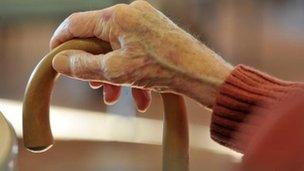Elderly 'face £150,000 care bill before hitting cap'
- Published

The cap on care costs in England is due to be introduced in 2016
Elderly people face paying £150,000 for residential care before they hit the cap on care costs in England, an analysis by Labour suggests.
The sum is more than double the £72,000 figure the cap will be set at when it comes into force in 2016.
That is because extra costs, such as the fees for accommodation, do not count towards the cap.
Labour said the public was being conned, but ministers said they had been clear about what the cap covered.
The research also suggested that the majority of people - six out of seven - who end up in a home will die before they hit the cap.
That is because the average length of stay in a care home is just over two years whereas it will take five years for most to reach the cap.
'Disappointed'
The £150,000 figure is based on how much a person would pay if so-called hotel costs, which include accommodation, food and bills, are factored in.
This will be set at £12,000 a year to start with.
It also includes the higher costs individuals face when purchasing care home places compared with the price councils get, which is what will count towards the cap.
As councils buy places in bulk, they are able to get cheaper deals.
Figures from analysts Laing and Buisson suggest the gap is about £90 a week.
According to the Labour analysis, that would mean individuals paying £610 a week for a care home place but only £292 counting towards the cap.
Labour itself is not proposing to cover accommodation costs, but said it was highlighting the figures because the government was not being "straight" with the public.
Shadow care minister Liz Kendall said: "Families deserve to be told the facts rather than being conned so they can properly plan for the future and not have the government attempt to pull the wool over their eyes."
Caroline Abrahams, of Age UK, said: "Many older people and their families who have assumed they will benefit from the social care reforms will be shocked and disappointed to find they may not receive much help.
"It is crucial that the public understands what costs are included under the cap and the impact the proposals will have."
Ministers said they had always been upfront about the accommodation costs and said one of the aims of the cap was to encourage the insurance industry to develop policies for old age that could cover much more of the fees.
They also pointed out that once a person's assets - including house and savings - started to drop below £118,000 the state would start contributing towards the cost of care which would mean those people would not have to pay the full amount towards the cap anyway.
This has been incorporated into the policy to protect the less well-off. What is more, they are also looking at allowing individuals to purchase care home places through their local authority to allow them to benefit from the lower rates.
A Department of Health spokeswoman added: "The government is introducing the first ever cap on care costs so that people no longer have to live in fear of unlimited care costs.
"Our changes will help hundreds of thousands and give peace of mind to many more."
- Published15 October 2013
- Published18 July 2013
- Published17 March 2013
- Published13 February 2013
- Published11 February 2013
- Published11 February 2013
- Published11 February 2013